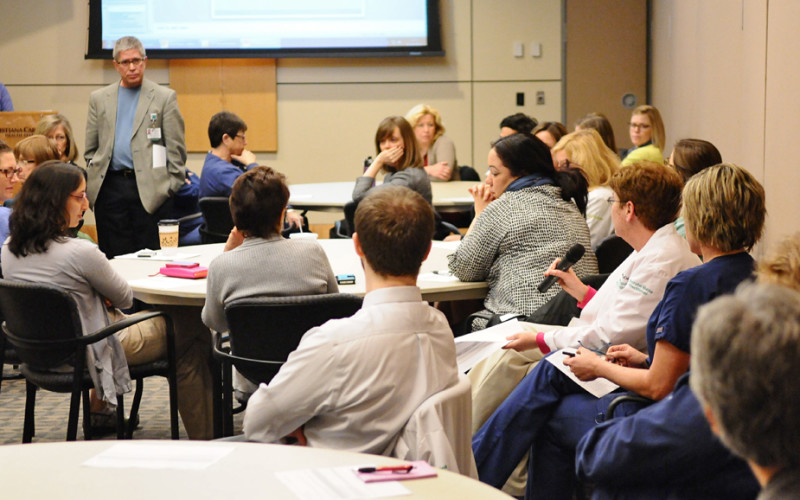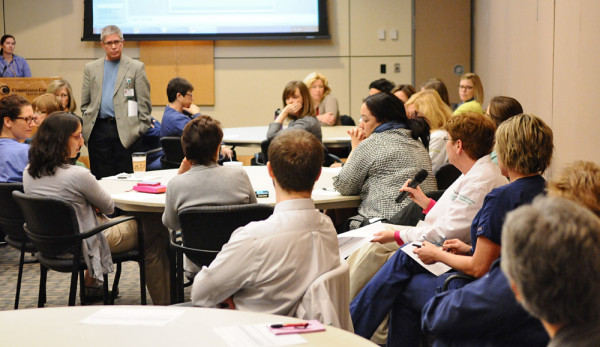Caregivers support each other in Christiana Care Way Rounds


The patient was a young woman, near death from injuries suffered in a brutal assault.
The trauma team quickly realized there was a second patient. The woman was pregnant.
The impact the mother and baby had on the clinicians who cared for them was the focus of The Christiana Care Way Rounds session on March 10, titled “Searching for Hope in the Darkness.”
These types of rounds give caregivers a way to express their empathy, said Kathleen McNicholas, M.D., FACS, JC, LLM, medical director, Performance Improvement. “We can’t just say this is a clinical experience,” she said. “We are dealing with real human beings, and The Christiana Care Way is a perfect vehicle for this powerful initiative.”
Co-sponsored by the Think of Yourself as a Patient Committee and Palliative Care, this quarterly series of conversations is an opportunity for colleagues to reflect on the emotionally challenging experience they share as expert, caring partners in their neighbors’ health.
I am bowled over by the compassion in this organization and the unsung heroes who show how much they care in so many ways.
Caregivers from the Emergency Department, Surgical Intensive Care Unit (SICU), Neonatal Intensive Care Unit (NICU), and others were encouraged to reflect on the case and share their feelings about the plight of the young woman and her baby.
“There’s no hierarchy here,” said John J. Goodill, M.D., FACP, FCCP, director of Palliative Medicine Education and Outreach. “Everyone is on an even level.”
Some of the caregivers’ responses: “Sad.” “Angry. Sick to my stomach.” “Preventable.” “Unfair.” “Heartbreaking.”
The baby weighed less than three pounds when she was delivered by emergency C-section. After the family gathered, she was baptized at her mother’s
bedside. While the mother was on life support, NICU nurses volunteered to take the baby to visit her each day. “I took pictures of the baby with her
mother’s hand so this little girl would have something to remember her by,” said Tamie Hotchkiss, RNC.
After the mother died, a number of nurses contributed money for the family. Chaplains from Pastoral Care provided support for the family and the caregivers.
“These kinds of cases involve many people from many departments, all working together to care for patients and their families,” said Shirley Brogley, ACHPN, ANP-BC, Palliative Medicine.
In reflecting on the mother and baby, caregivers pondered their feelings. One nurse said she thought anger management should be taught in high schools. Another expressed admiration for the mother’s determination to live long enough to give birth.
Talking about feelings and nurturing empathy ultimately has a positive impact on care, said Shawn R. Smith, MBA, vice president, Patient Experience.
“I am enthusiastic about our dialogue on the emotional impact care has on patients and the caregivers,” he said.